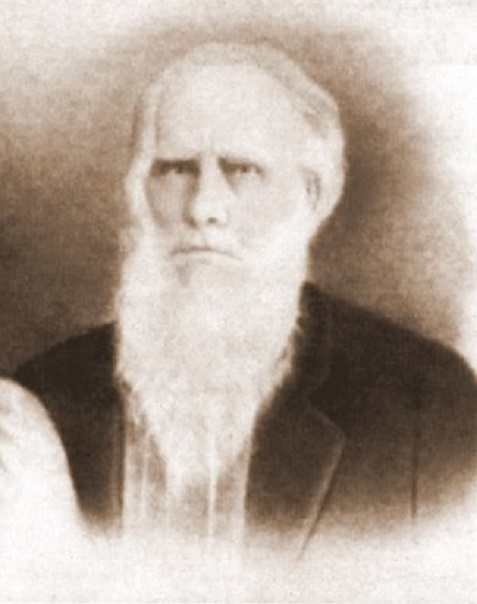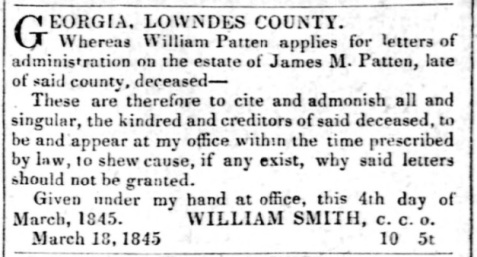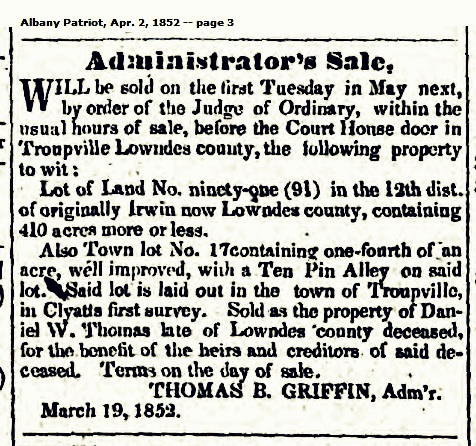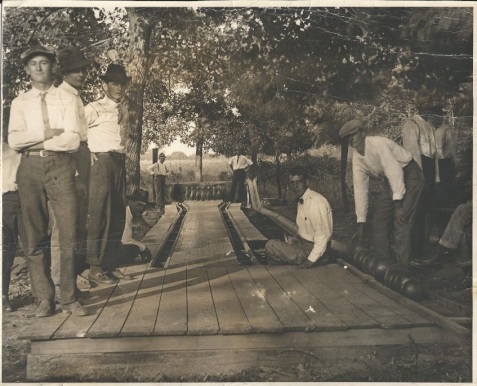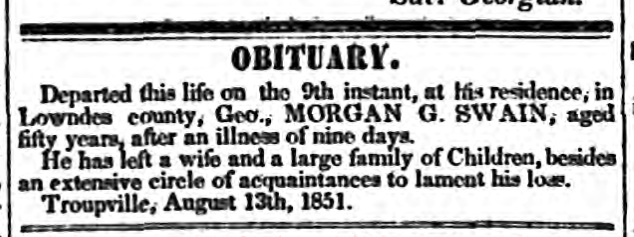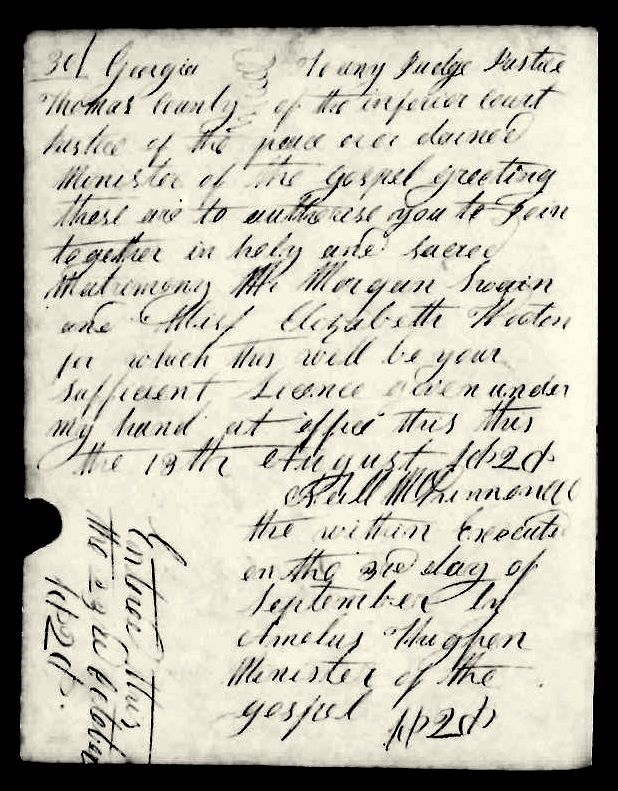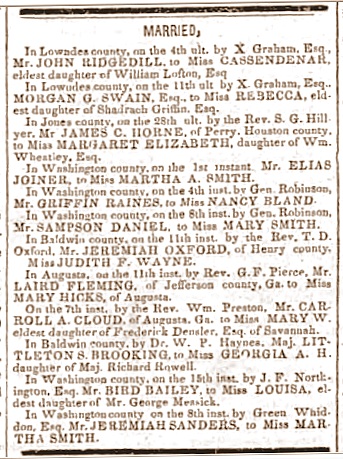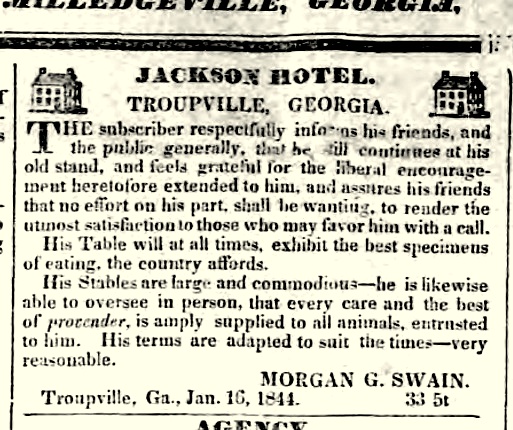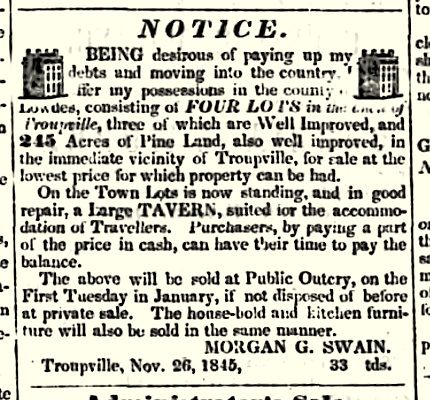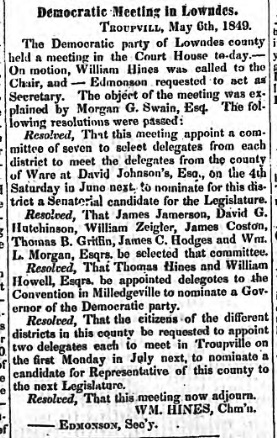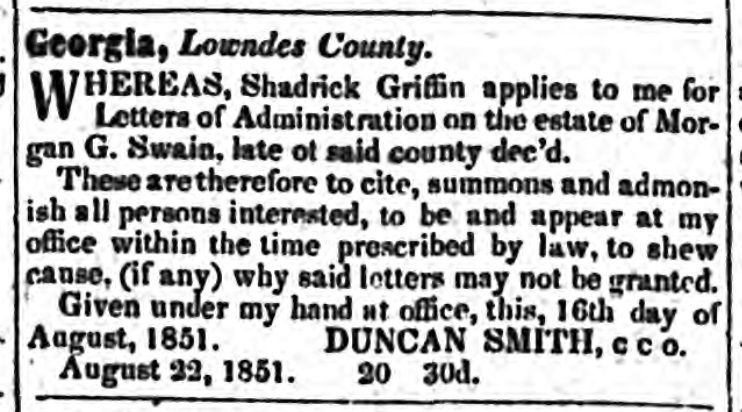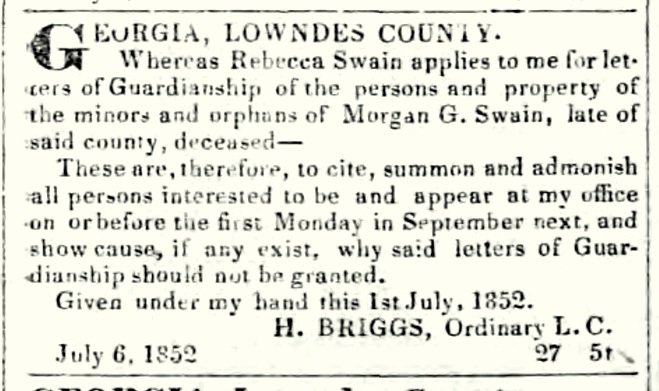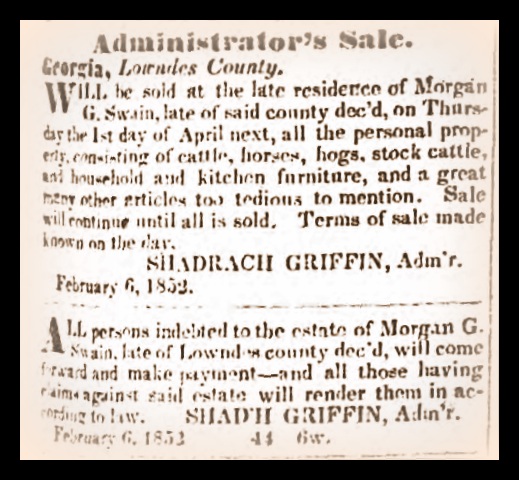In June of 1845, The Grand Jury of Lowndes County, Georgia convened at Troupville, GA. The reader will bear in mind that in 1845, Lowndes encompassed all of present day Berrien, Cook, Brooks, Lanier, and parts of Tift, Colquitt, and Echols counties, as well. So the citizens on this 1845 grand jury were the friends and neighbors of the Knights, Giddens, Sirmans, and others who settled around present day Ray City, GA.
It had been 20 years since Judge Holt had convened the first Lowndes Superior court in 1825 at the home of Sion Hall on the Coffee Road. In the intervening years, not one, but three Courthouses had been built. The first courthouse was at Franklinville, but after a few years the county seat was moved to Lowndesville, and then to Troupville, in the fork of the Withlacoochee and Little rivers. The 1845 Court may have been conducted with a bit decorum, than the original. Then again, it may not have been. Troupville was said to be a wicked place, with horse racing & other gambling, drinking, games and amusements.
Judge Carlton B. Cole presided at the 1845 court session, and Duncan Smith served as clerk of the Court.
The jurors were Samuel E. Swilley, John W. Spain, John Carter, Sr., Enoch Hall, Matthew M. Deas, James Wade, Jesse Hunter, Mathew Young, James McMullen, John McMullen, James Sowell, A. S. Smith, William H. Devane, Sampson G. Williams, William Folsom, Thomas B. Griffin, David Matthis, Ezekiel W. Parrish, Dennis Wetherington, Joshua Limeberger, and Henry Strickland, with Robert Micklejohn serving as foreman of the Jury.
Robert Micklejohn (1799-1865)
Robert Micklejohn was born July 2, 1799 in Louisville, GA, which was named in honor of King Louis XVI and was then serving as the State Capitol of Georgia. At the age of five, he moved with his parents, George Micklejohn and Elizabeth Tanner,to Milledgeville, GA which became the state capitol in 1806. He married Mary Jane Sowell on September 3, 1823 in Milledgeville, GA. In 1830-31, he served as Tax Collector of Baldwin County. He came to Lowndes County about 1845 where he entered into a partnership with Richard Allen, Robert Prine, and his brother-in-law James Sowell. Invoices in probate records indicate Robert Micklejohn also worked for Captain Samuel E. Swilley as a tutor and clerk. By 1850 he returned to Milledgeville, where he served as clerk of the City Council and as a Justice of the Peace. Robert Micklejohn died on his 66th birthday, July 2, 1865. His grave is at Memorial Hill Cemetery, Milledgeville, GA.
Captain Samuel E. Swilley (1793-1846)
Captain Samuel E. Swilley was a military leader in the late 1830s conflicts with Native Americans. His company of men fought in the Battle of Brushy Creek, actions at the Little River and at Grand Bay, August, 1836, and led the Skirmish at Troublesome Ford. Samuel Swilley came from Appling County to Lowndes in 1827, bringing his wife and children to settle about 23 miles south of the Lowndes county seat at Franklinville. He established a large plantation on Hammock Lake near present day Lake Park, GA, where he constructed a substantial log house on the edge of the woods and log cabins for his slaves in the midst of his corn fields. He built a water-powered mill with a grist mill, cotton gin and sawmill. In all, his land holdings in Lowndes county consisted of more than 5000 acres. He was a member of the Democratic Republican Party of Lowndes County. Just a year after serving on the Grand Jury, in the fall and winter of 1846, a deadly fever struck the Swilley household taking the lives of Mr. Swilley, his wife and most of their children. For years thereafter, it was referred to as the Swilley Fever.
David Mathis (1802-1875)
David Mathis was a Whig and a strong supporter of state’s rights. He was among the Pioneers of Old Lowndes Toast[ing] State Rights and American Independence at the Fourth of July 1835 Jubilee at Troupville, GA. In 1836, he served in Captain Levi J. Knight’s Company in the Last Indian Fight in Berrien County. “David Mathis, oldest son of John Mathis, was born in North Carolina in 1802, and was brought as an infant by his parents to Bulloch County, Georgia. He was married in 1822 to Miss Sarah Monk, born 1801 in Bulloch County a daughter of William and Jerushia Monk. David Mathis brought his family to what was then Lowndes County in the winter of 1825-1826, and settled on lot 102, 9th district. This is one mile east of the present village of Cecil, Cook County. In January 1826, he built his log home, a sturdy and comfortable home that he occupied until his death about fifty years later. This home was on the Coffee Road, main thoroughfare of travel in those days from middle Georgia into southwest Georgia and Florida. It was a stagecoach stop where the horses were rested. Many people in those pioneer days enjoyed the hospitality of the Mathis home. Mr. Mathis was ensign of the militia in the 658th district, 1828-1840, and Justice of Peace, same district, 1829-1834. In the Indian Wars of 1836, he provided forage for the Volunteers of Hamilton W. Sharpe’s Company. He served as Justice of Berrien Inferior Court, 1861-1862. Mr. Mathis was a member of Pleasant Primitive Baptist Church into which he was baptized about 1840, but later transferred his membership to Salem Church which is now in the City of Adel. His wife was a member also. He died about 1875 and his wife died soon after. They were buried at Pleasant Church.”
John Carter, Sr. (1794-1880)
According to descendants “John Carter was born in Colleton District, South Carolina in 1794. John usually signed his name as John Carter, Sr., to distinguish himself from his first cousin John Carter. He was a son of Elijah Carter. He was married in Colleton about 1825 and his wife Lavinia, born 1799 in South Carolina. Her maiden name is unknown. Mr. Carter removed from his old home in South Carolina, near Little Salkehatchie River to Lowndes County, GA, in 1830. Mr. Carter was a First Lieutenant in the militia in the 661st district of Lowndes County, 1832-33 and served again in the same company between 1835-39. He served an enlistment as a private under Capt. Samuel E. Swilley in the 2nd Regiment, 2nd Brigade of the Florida Mounted Volunteers, June 16th to Dececember 16th, 1837, in the 2nd Florida Indian War. It was noted he entered into this enlistment with 1 black horse. He was Honorably Discharged from Ft Gilleland on December 18. He enrolled at Ft Palmetto in [Levy County, Florida]. John Carter, Sr., was baptized into the membership of Union Primitive Baptist Church; August 9, 1840; and the next year, on June 9, 1841, was dismissed by letter with others, to join in the constituting of Antioch Church which was nearer his home. He became a charter member of Antioch and continued as a member there for some years, as did his wife. Their home was cut out of Lowndes into Echols County in 1858.”
Matthew M. Deas (1794-1873)
“Matthew M. Dees, an early prominent citizen of Lowndes County, was born in South Carolina, in 1794, and was a son of John Dees, R. S., and his wife, Mary. The parents moved with their children to Tattnall County, Ga., at an early date, and it was there that the subject grew to manhood and married. His first wife by whom his children were born, was Jane Strickland, born 1795 in N. C. daughter, of Lewis and Martha Grantham Strickland, a pioneer Tattnall County family. In 1829, Matthew M. Dees removed from Tattnall County to Madison County, FL, and settled near the Georgia line, thence he moved to Lowndes County about the time the Indian War began, and he acquired lands in the present Clyattville district of Lowndes County. He served as Major of the 138th Battalion, Lowndes County militia, 1838-1841. About 1845 he moved to the Bellville section of Hamilton County, Fla., only a few miles from his former Georgia home, and lived there until his death about 1872. He served as County Commissioner of Hamilton County, 1849-1851, and as a Justice of Peace there, 1863-65. The first wife died in 1851, in Hamilton County, and Mr. Dees was married to Rebecca Downing, Jan, 9, 1853, in Hamilton County. She was born 1802 in South Carolina. She survived her husband several years. He is listed in the 1850 Census for Hamilton County, FL (56 years old) Maj. Dees died intestate in Hamilton Co. Fla., November, 1873”
Matthew Young
Matthew Young was among the prosperous planters living near Troupville, GA and making that town their trading headquarters. The 1850 agricultural census of Lowndes County shows Matthew Young owned 3040 acres of land, 300 acres of which were improved. He had $440 worth of farm equipment and machinery, five horses, a mule, 30 milk cows, two oxen, 70 other cattle, 75 sheep and 100 hogs. His crib was stocked with 800 bushels of Indian corn, 400 bushels of sweet potatoes, and 25 lbs of butter. He had 28 bales of ginned cotton at 400 lbs each, and 150 lbs of wool.
A.S. Smith
A.S. Smith was a Storekeeper at Troupville, GA.
Sampson G. Williams (1808-1896)
Sampson G. Williams lived in McCraney’s District, Lowndes County. was one of the fortunate drawers in the 1832 Cherokee Land lottery. He was born January 31, 1809, a son of James Williams, Revolutionary Soldier, and Elizabeth Holleway. Sampson Griffin Williams married Elizabeth McCranie, daughter of Daniel “Big Thumb” McCranie, on March 10, 1831 in Lowndes, later Berrien, and now Cook County. His place was 490 acres on Land lot 323, 9th District. S. G. Williams served in Hamilton W. Sharpe’s company in the Indian Wars of 1836, and later was elected Senator in the Georgia Assembly.
Thomas B. Griffin (1816-1877)
Thomas Butler Griffin was born 1816 in Montgomery Co, GA, and lived in Old Troupville in Lowndes County, GA. He was a wealthy merchant and planter, a member of the Lowndes County Democratic Party. He, along with Andrew J. Clyatt, Duncan Smith, and John W. Spain, represented Lowndes County at the May 3, 1841 Convention of Democratic Young Men of Georgia, in Milledgeville, GA. In a meeting at Swain’s Inn at Troupville, Thomas B. Griffin, was selected delegates to the Convention in Milledgeville to nominate a Governor of the Democratic party. In 1843, He married Jane Moore, daughter of Jesse Moore and Rebecca Studstill. She was born 1827 in Bullock Coounty, GA, and died April 13, 1892 in Lowndes County. Thomas B. Griffin, was the Sheriff of Lowndes county 1846-1848. In 1860 Thomas B. Griffin was enumerated as the owner of 12 slaves. He moved from Troupville to the new town of Valdosta when it was formed, and according to the Valdosta Historic Downtown Visitor’s Guide, owned the first store in Valdosta, located at Patterson and Hill Avenue. Thomas B. Griffin was elected State Senator for the period of 1861-1863. In 1868, his son, Iverson Lamar Griffin, was allegedly involved in the bombing of a gathering of Freedmen attending a political speech. In 1873, he was one of the incorporators on the Valdosta and Fort Valley Railroad. Thomas B. Griffin died January 20, 1877 in Lowndes Co, GA.
Ezekiel W. Parrish (1818-1887)
Ezekiel W. Parrish, born February 16, 1818, in Bulloch county, Georgia, son of Henry Parrish and father of Ansel A. Parrish, was very young when his parents removed to southern Georgia and after his father’s death he remained with his mother until his marriage, when he bought land one mile from where is now located the town of Cecil and there engaged in farming and stock-raising. In 1864 he sold his farm and received its value in Confederate money, which he still held when the war closed, but fortunately he had retained about seventeen hundred acres east of Hahira in Lowndes county. He settled on the latter estate, erected the necessary buildings and made it his home until his death on September 1, 1887. Martha C. (Wootten) Parrish, his wife, born in Taliaferro county, Georgia, had preceded him in death, her demise having occurred in June, 1871. She was a daughter of Redden Wootten and wife, the latter of whom was a Miss Bird before her marriage.
Joshua Lymburger (1809-1848)
Joshua Lymburger or Limeberger came from Effingham to Lowndes county,GA some time before 1834 and settled with his wife in Captain Dees’ district. He was a son of Israel Christian Limeberger and Mary Catherine Schneider. Joshua Limeberger married Salome Schrimp on January 10, 1830 in Effingham County, GA. In 1834, he owned 490 acres in Irwin county and was the agent of record for 2027 acres in Houston county under his father’s name. By 1848 he owned two lots of land [980 acres MOL] in Lowndes County. Joshua Limeberger died May 13, 1848 in Lowndes County, GA. His grave is at Forest Grove Cemetery, Clyattville, GA.
John W. Spain (1818-1870)
John William Spain, born December 4, 1818, a son of Levi Spain and Rachel Inman Spain. His father died while John was a minor. According to an article by Nancy Young Schmoe, John William Spain and widowed mother Rachel Inman Spain, came about 1826 to the section of Lowndes County now known as Kinderlou. “They came from the Carolinas and were of Welsh descent. John William then bought twenty five thousand acres of land on both sides of the Withlacoochee River, and soon moved with his family across the river and built a home known as Forest Hill,” on a bluff overlooking the Withlacoochee about six miles southeast of present day Quitman, GA. “The road running beside the house was an old stage coach road that came out of Lowndes County into Brooks, crossing the Withlacoochee at a place known as ‘Spain’s Crossing,’ where a ferry boat plied the river for many years.” His mother married on March 26, 1826 to Major Frances Jones, a wealthy planter who built one of the earliest plantation mansions of Lowndes county, known today as Eudora Plantation (in present day Brooks County). As an orphan, John William Spain, received a draw in the Cherokee Land Lottery of 1832, drawing Lot 127, 11th Dist., 2nd Sect., Gilmer County. John William Spain married Elizabeth Young (1822-1885). John W. Spain was a member of the Democratic Republican Party. He was elected as the Lowndes county representative to the state legislature for the 1841-1843 term. John W. Spain, along with Andrew J. Clyatt, Duncan Smith, and Thomas B. Griffin, represented Lowndes County at the May 3, 1841 Convention of Democratic Young Men of Georgia, in Milledgeville, GA. In 1844, the Georgia Legislature passed an act “to establish John W. Spain’s bridge across the Withlacoochee river, on his own land, in the 12th district of Lowndes county, and rate the ferriage for the same.” In the 1850s he served as postmaster of the post office at Piscola, Lowndes, County, GA. Among his properties, Spain owned Lot #10 of the 15th district, in Brooks County. In 1859, he served as a Brooks County Road Commissioner. At the onset of the Civil War, he provided $2000 to equip the Brooks Rifles militia company with rifles. Applied for and received a presidential pardon from President Andrew Johnson for acts of Rebellion, August 28, 1865. Died November 7, 1870; grave at West End Cemetery, Quitman, GA.
Enoch Hall (1804-1886)
Enoch Hall, a Lowndes county pioneer and son of Sion Hall and Mrs. Bridget “Beady” Hall, was an overseer in the laying out of the Coffee Road, and settled with his father near present day Morven, GA, about 1823 shortly after the opening of the road. Justice of the Lowndes County Inferior Court, 1832-37. Served as Lt. Colonel, Lowndes County, 81st Regiment, Georgia Militia, under Colonel Henry Blair. Enoch Hall led, as a Major, a company of men in Actions at the Little River and at Grand Bay, August, 1836 Together with his father, Sion Hall, the Halls held 2,680 acres of pine lands in the 12th Land District of Lowndes County, 1220 acres in Cherokee County, 2027 acres in Lee County, 2027 acres in Carroll County and 4054 acres in Randolph County, GA. Died September 2, 1886; grave at Hall Cemetery, Morven, GA.
James Wade
James Wade, Soldier, McCraney’s, Lowndes County, GA was one of the lucky drawers in the 1832 Cherokee Land Lottery. He served on the May 1933 term of the Lowndes County Grand Jury. He was one of the Commissioners appointed by the Georgia legislature in 1834 “to contract for and cause to be built in the county of Lowndes a suitable Court-house and Jail.”
Jesse Hunter (1811-1871)
Jesse W. Hunter was born about 1811 in Georgia, a son of Abraham Hunter and Ann Rushing. According to the History of Brooks County, he came to Lowndes County about 1823, shortly after the opening of the Coffee Road, with his mother and father, who settled in the fork of the Okapilco and Mule Creeks. The 1844 Lowndes County Tax Digest shows Jesse W. Hunter owned 301 acres of pine lands in Lowndes County and 360 acres of hardwood in Cherokee County. His Lowndes county home was cut into Brooks county when it was formed in 1858. During the Civil War, he was drafted into Company F, 5th Georgia Regiment, but petitioned Governor Brown for a discharge on account of age and infirmity. Jesse W. Hunter died August 16, 1871. The grave of Jesse W. Hunter, and the grave of his wife Elizabeth are at Union Church Cemetery (aka Burnt Church), near Lakeland, GA.
James Sowell
James Sowell was a brother-in-law of Robert Micklejohn, who served as foreman of the 1845 Grand Jury of Lowndes County. He was born 1801 in Bertie North Carolina, a son of Ezekiel Sowell and Ann Layton. He came with his family to Georgia some time before 1823, and on December 8, 1826 James Sowell married Milly Rape in Henry County, GA. James Sowell, Hood’s District, Henry County was a lucky drawer in the 1832 Cherokee Land Lottery, drawing lot number 159 in the Tenth District,Third Section of the Cherokee Country. Tax digests show that James Sowell had arrived in Lowndes County, GA by 1844, settling in Captain Samuel E. Swilley’s District. The 1850 census shows James and Milly in Lowndes County with their nine children. Some time before 1860, James Sowell moved his family to Florida where they were enumerated in Hamilton County.
James McMullen (1806-1865)
According to A History of Savannah and South Georgia, Vol 2, “James McMullen was born and reared in Georgia. His father was one of the earlier settlers of Georgia, having located in Thomas county while that section of the country was in its pristine wilderness. He was of thrifty Scotch ancestry and a man of sterling integrity. James McMullen was trained to habits of industry and early showed natural ability as a mechanic. Although he never learned a trade, he became an expert with tools, and could do general blacksmithing, or make either a barrel or a wagon. After his marriage he lived for a while in Thomas county, from there removing to that part of Lowndes county that is now a part of Brooks county. Purchasing land in the Hickory Head district, he was there a resident until his death at the age of sixty years. He married Harriet Rountree, who was born in Lowndes county, where her father, a pioneer settler, was murdered by negroes while taking the produce of his farm to one of the marketing points in Florida, either Tallahassee or Newport. She too died at the age of three score years…In his political affiliation James McMullen was a Whig, and long before there were any railroads in Georgia he served as a representative to the state legislature.” His daughter, Martha McMullen, married Edward Marion Henderson, who died of wounds after the 1836 Battle of Brushy Creek. In 1859, James McMullen served as a Brooks County Road Commissioner. Died December 6, 1865; grave at James McMullen Cemetery, Brooks County, GA.
John McMullen (1808-1868)
According to the 1913 text Georgia’s Landmarks, Memorials, and Legends, “John and James McMullen, brothers, were among the earliest pioneers to enter the pine solitudes of this section [present day Brooks County] of Georgia…” John married Nancy Rountree and James married Harriet Rountree, daughters of Francis Rountree, of Lowndes County, GA. In 1859, John McMullen served as foreman of the first Grand Jury in Brooks County.
William H. Devane (1817-1869)
William H. Devane was a farmer in the 53rd Division of Lowndes County, GA. He came with his parents to Lowndes County as a boy around 1828. His father, Benjamin Devane, was a veteran of the War of 1812, and served in the Indian Wars in Florida and Georgia; In 1838, Benjamin Devane served as a private in Captain Levi J. Knight’s Company. William H. Devane married his first cousin, Margaret A.Rogers, about 1841. In 1859, he served as a Brooks County Road Commissioner. At the onset of the Civil War, William H. Devane sought to raise a company of Brooks County volunteers, but ended up enlisted in Company E, Georgia 1st Infantry Regiment.
David McCall (1802-1881)
David McCall, Jr, was born in 1802, a son of David McCall and Frances “Fannie” Fletcher. He married Eleanor Johnson on July 20, 1825 in Tatnall County, GA; she was born in 1810. In 1835 they made their home in Appling County, GA. Some time before 1844, they relocated to Lowndes County, Georgia. He was later a hotel keeper in Valdosta, GA.
William Folsom
William Folsom was the uncle of Penneywell Folsom, who fell at Brushy Creek in the Indian Wars of 1836. The Folsom place was located near the Coffee Road, and about a mile and a half further west is where the road crossed the Little River. “The Folsom bridge, a noted crossing place, spans the [Little] river here.” The Folsoms had built a small fort against Indian attacks, and it was from this fort that the Lowndes county pioneers marched to the encounter at Brushy Creek. In 1837, William Folsom served on the commission appointed to select a new site for the Lowndes county seat of government; a location at the junction of the Withlacoochee and Little Rivers was chosen, and Troupville became the county site.
Dennis Wetherington (1807-1885)
Dennis Wetherington, an early settler of Lowndes County, was born in South Carolina, October 1, 1807, a son of Peter Wetherington. He moved to Lowndes County with his parents between 1825 and 1830. In 1831, he first married Sarah Carter, a daughter of Captain Jesse Carter and Mary “Molsy” Touchton. The couple settled on a farm in the present day Naylor District. Dennis Wetherington was baptized into the membership of Union Church, February 11, 1832, and was dismissed by letter to join in constituting Unity Church nearer his home, about 1842. Molsy Carter Wetherington died about 1850. After her death, Mr. Wetherington married 2) Rebecca Roberts, daughter of John C. Roberts, who lived on Cow Creek. Upon Rebecca’s death, he married her sister, Elizabeth Roberts. This according to Folks Huxford.
Henry Strickland (1794-1866)
Henry Strickland was born in 1794 in Georgia. He married Sarah Lanier November 6, 1820 in Effingham County, GA. He moved his family to Lowndes County about 1831 and settled in Captain Caswell’s District. The 1834 Lowndes County tax digest shows he owned 930 acres in Lowndes County, 400 acres in Effingham County, 490 acres in Appling, 490 acres in Thomas County, 250 acres in Baker county, 2027 acres in Lee County, and 2027 acres in Meriwether County. Henry Strickland was Justice of Lowndes Inferior Court from 1833 to 1837 and again from 1857 to 1859; December 23, 1835 appointed commissioner to select the site of the Lowndes County courthouse and jail; Major of the 138th Battalion, Georgia Militia, 1836 to 1838 – participated in actions at the Little River; December 22, 1837, appointed to the board of trustees for the proposed Lowndes County Academy at Troupville; Primitive Baptist; affiliated with Friendship Church along with wife, Sarah, soon after moving to Lowndes County; membership received by letter in March, 1846 at Old Antioch Church, now in Echols county, elected church clerk; died 1866.
